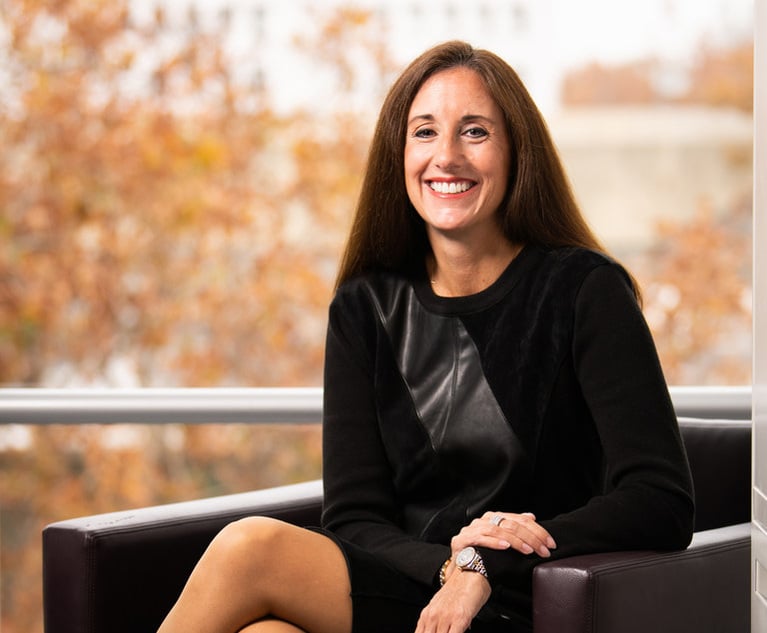What Can Be Learned From 'Virtual' Firms as Coronavirus Necessitates Remote Work?
Brick-and-mortar firms weren't built with remote work in mind, say the leaders of distributed firms, so they face obstacles both physical and cultural as more attorneys log in from home to limit the spread of COVID-19.
March 12, 2020 at 03:03 PM
5 minute read
The original version of this story was published on The American Lawyer
 A commuter wears a mask while riding a subway train in New York, U.S. Photo: Victor J. Blue/Bloomberg
A commuter wears a mask while riding a subway train in New York, U.S. Photo: Victor J. Blue/Bloomberg
The continued march of COVID-19 across the world has law firms scrambling to boost their infrastructure as offices close and attorneys and staff are forced to work remotely.
But for distributed firms, also known as "virtual" law firms, business has continued as usual. Some leaders of these firms say they see structural obstacles ahead for their brick-and-mortar competitors who are now grappling with the prospect of an entirely remote workforce.
Just this week, Faegre Drinker Biddle & Reath closed all 22 of its U.S. offices for a day after a COVID-19 scare in its Washington, D.C., outpost—its non-D.C. offices reopened Wednesday.
Quinn Emanuel Urquhart & Sullivan shuttered its New York office after a partner tested positive for the coronavirus. And many firms are preparing in case they have to follow suit, some undergoing stress tests for their IT networks, which have never before experienced the load of an entirely remote workforce.
But few things have changed at distributed firm Culhane Meadows Haughian & Walsh, which boasts 70-plus lawyers over several markets. All of those attorneys work remotely, though the firm maintains small offices used primarily for mail and client meetings. Managing partner Grant Walsh said partners in each market will be allowed to decide informally whether or not they will gather in person for their monthly face-to-face partner meetings.
"Nothing has really changed," Walsh said. "We told our partners that they can stay home if they aren't comfortable. Instead, I've asked partners to have lunch over video chat."
But Walsh and other distributed firm leaders see looming obstacles ahead for traditional firms that were not built from scratch with remote work in mind.
For one, there are logistical issues, Walsh said. Are staff, who are used to working at their desktops, getting adequate equipment to work from home? How reliable are the laptops for attorneys and staff? Is there a quick and reliable way for computer or equipment issues to be resolved? And are the servers maintained by the firm powerful enough to handle the increased traffic due to remote working?
Firms across the world, from Hogan Lovells to Linklaters, are trying to answer the latter question by performing "stress tests" on their IT infrastructure. Slaughter and May had half of its employees work from home last week as part of their test. Clifford Chance is set to run a two-day remote working test in its London office.
And even if firm servers are up to the challenge, there's the question of data security, said Walsh. Culhane Meadows intentionally paid for a "very expensive" encrypted intranet to protect attorney-client privilege. While Big Law firms have, for the most part, taken similar steps for their in-house servers, do those protections extend to the devices and internet networks of attorneys and staff who are now working from home?
Apart from the physical challenges firms face, there are more cultural obstacles at play in law firms. As opposed to distributed firms such as Culhane Meadows and FisherBroyles, which only hire and retain experienced partners, many Big Law firms rely on in-office contact as a way to keep the various categories of lawyers and staff connected. Big Law firm associates with questions can pop in and out of partner offices down the hall; file clerks diligently track down important documents in the file room.
These multiple levels on the chain of command—the first-year associate coordinating with the mid-level associate, who coordinates with the senior associate, who then coordinates with a partner—can become quickly cumbersome when thousands of attorneys are suddenly required to work from home, said Kevin Broyles, co-founding partner of distributed firm FisherBroyles.
"Interoffice huddles are inefficient enough," Broyles said. "Now the old rumor game will play out in real life over the phone from one attorney to another and back again as multiple drafts are massaged by the pyramid of attorneys."
As Peter Miller, the chair and managing partner of Seyfarth Shaw, put it to The American Lawyer this week, face-to-face time is an important training tool for its young associates.
"The legal industry is still an apprenticeship, and we're still trying to train our young lawyers to become partners and take over the firm and become the next generation of firm leaders," Miller told The American Lawyer on Monday. "There's no substitute for face-to-face teaching and the like."
But Walsh sees a silver lining in the current state of the coronavirus pandemic—at least in the resulting mad rush to get people working remotely. He hopes firms that have been stubbornly resistant to more flexible work arrangements go through this experience with a new appreciation for remote work and a new perspective on its efficacy and productivity.
Walsh said working from home has allowed him to be more present in the lives of his three young children, go to school meetings and watch his children give presentations in class. He hopes more attorneys at more firms can have that opportunity in the future.
"I think the good news is that law firms may start to rethink how they're working," Walsh said, "and take cues from cloud-based firms like ours."
Read More
Faegre Drinker Reopens Most Offices After 2 DC Visitors Test Positive for Coronavirus
Coronavirus: Linklaters Stress-Tests Its Systems In Global Remote Working Exercise
Growing a Practice Without Walls: Real Life in a Virtual Law Firm
NOT FOR REPRINT
© 2025 ALM Global, LLC, All Rights Reserved. Request academic re-use from www.copyright.com. All other uses, submit a request to [email protected]. For more information visit Asset & Logo Licensing.
You Might Like
View All

EB-5 Rebounds After a Rocky Year: Challenges of 2024 Lay Groundwork for a Booming 2025

Are Counsel Ranks Getting 'Squeezed' as Nonequity and Associate Pay Grows?
5 minute readLaw Firms Mentioned
Trending Stories
Who Got The Work
J. Brugh Lower of Gibbons has entered an appearance for industrial equipment supplier Devco Corporation in a pending trademark infringement lawsuit. The suit, accusing the defendant of selling knock-off Graco products, was filed Dec. 18 in New Jersey District Court by Rivkin Radler on behalf of Graco Inc. and Graco Minnesota. The case, assigned to U.S. District Judge Zahid N. Quraishi, is 3:24-cv-11294, Graco Inc. et al v. Devco Corporation.
Who Got The Work
Rebecca Maller-Stein and Kent A. Yalowitz of Arnold & Porter Kaye Scholer have entered their appearances for Hanaco Venture Capital and its executives, Lior Prosor and David Frankel, in a pending securities lawsuit. The action, filed on Dec. 24 in New York Southern District Court by Zell, Aron & Co. on behalf of Goldeneye Advisors, accuses the defendants of negligently and fraudulently managing the plaintiff's $1 million investment. The case, assigned to U.S. District Judge Vernon S. Broderick, is 1:24-cv-09918, Goldeneye Advisors, LLC v. Hanaco Venture Capital, Ltd. et al.
Who Got The Work
Attorneys from A&O Shearman has stepped in as defense counsel for Toronto-Dominion Bank and other defendants in a pending securities class action. The suit, filed Dec. 11 in New York Southern District Court by Bleichmar Fonti & Auld, accuses the defendants of concealing the bank's 'pervasive' deficiencies in regards to its compliance with the Bank Secrecy Act and the quality of its anti-money laundering controls. The case, assigned to U.S. District Judge Arun Subramanian, is 1:24-cv-09445, Gonzalez v. The Toronto-Dominion Bank et al.
Who Got The Work
Crown Castle International, a Pennsylvania company providing shared communications infrastructure, has turned to Luke D. Wolf of Gordon Rees Scully Mansukhani to fend off a pending breach-of-contract lawsuit. The court action, filed Nov. 25 in Michigan Eastern District Court by Hooper Hathaway PC on behalf of The Town Residences LLC, accuses Crown Castle of failing to transfer approximately $30,000 in utility payments from T-Mobile in breach of a roof-top lease and assignment agreement. The case, assigned to U.S. District Judge Susan K. Declercq, is 2:24-cv-13131, The Town Residences LLC v. T-Mobile US, Inc. et al.
Who Got The Work
Wilfred P. Coronato and Daniel M. Schwartz of McCarter & English have stepped in as defense counsel to Electrolux Home Products Inc. in a pending product liability lawsuit. The court action, filed Nov. 26 in New York Eastern District Court by Poulos Lopiccolo PC and Nagel Rice LLP on behalf of David Stern, alleges that the defendant's refrigerators’ drawers and shelving repeatedly break and fall apart within months after purchase. The case, assigned to U.S. District Judge Joan M. Azrack, is 2:24-cv-08204, Stern v. Electrolux Home Products, Inc.
Featured Firms
Law Offices of Gary Martin Hays & Associates, P.C.
(470) 294-1674
Law Offices of Mark E. Salomone
(857) 444-6468
Smith & Hassler
(713) 739-1250







